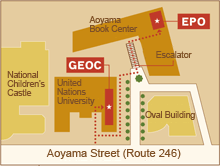On 30 May 2015, United Nations University Institute for the Advanced Study of Sustainability (UNU-IAS), the Ministry of the Environment of Japan (MOEJ) and the Global Environmental Outreach Centre (GEOC) will organize the public symposium Connecting and Supporting Forests, the Countryside, Rivers and the Sea to celebrate the UN International Day for Biological Diversity (IDB).
Every year, commemorative ceremonies for the IDB are held all over the world to increase awareness and understanding of biodiversity issues. This year’s international theme for the IDB is “Biodiversity for Sustainable Development”.
This symposium will discuss how to conserve the richness of interconnected forests, countrysides, rivers and seas, as well as ways of enhancing their bounty. In the symposium, MOEJ’s project team “Connecting and Supporting Forests, the Countryside, Rivers and the Sea” will present on the preliminary results of dialogues and discussions they have held with local governments and experts on this issue.
Background
Our lives are supported by nature’s bounty, such as clean water and air, food and other resources, as well as distinctive cultures and leisure activities based on nature. Such fertile, natural bounty are provided by interconnected forests, countrysides, rivers and seas. However, overuse and poor management of the environment and unsustainable development have disconnected the linkages between these ecosystems, degrading their quality. Furthermore, climate change has been accelerating the speed of such fragmentation and degradation.
Please note that this symposium will be conducted in Japanese; English interpretation will not be provided.
For more information and an event programme, please visit the event page on our Japanese website.
****
This event will be organized by United Nations University Institute for the Advanced Study of Sustainability (UNU-IAS), the Ministry of the Environment of Japan(MOEJ), and the Global Environmental Outreach Centre (GEOC) with the cooperation of the Japan Committee for the United Nations Decade on Biodiversity (UNDB-J), as part of GEOC’s project activities.

















